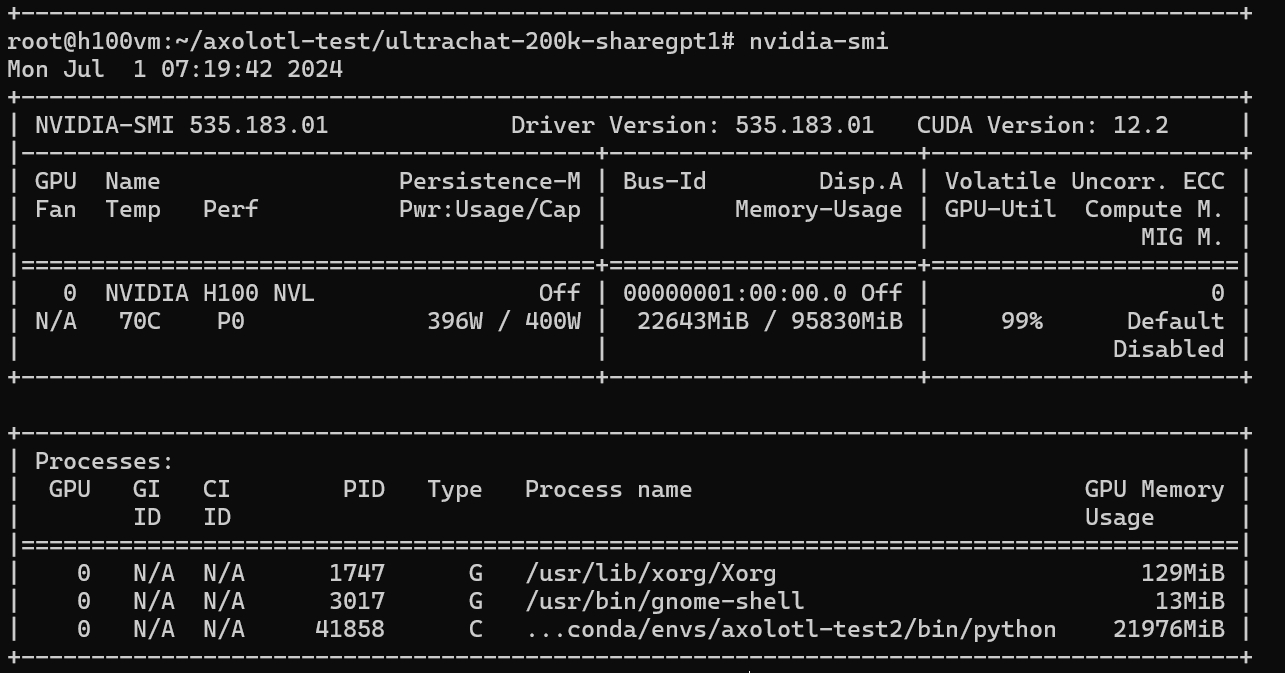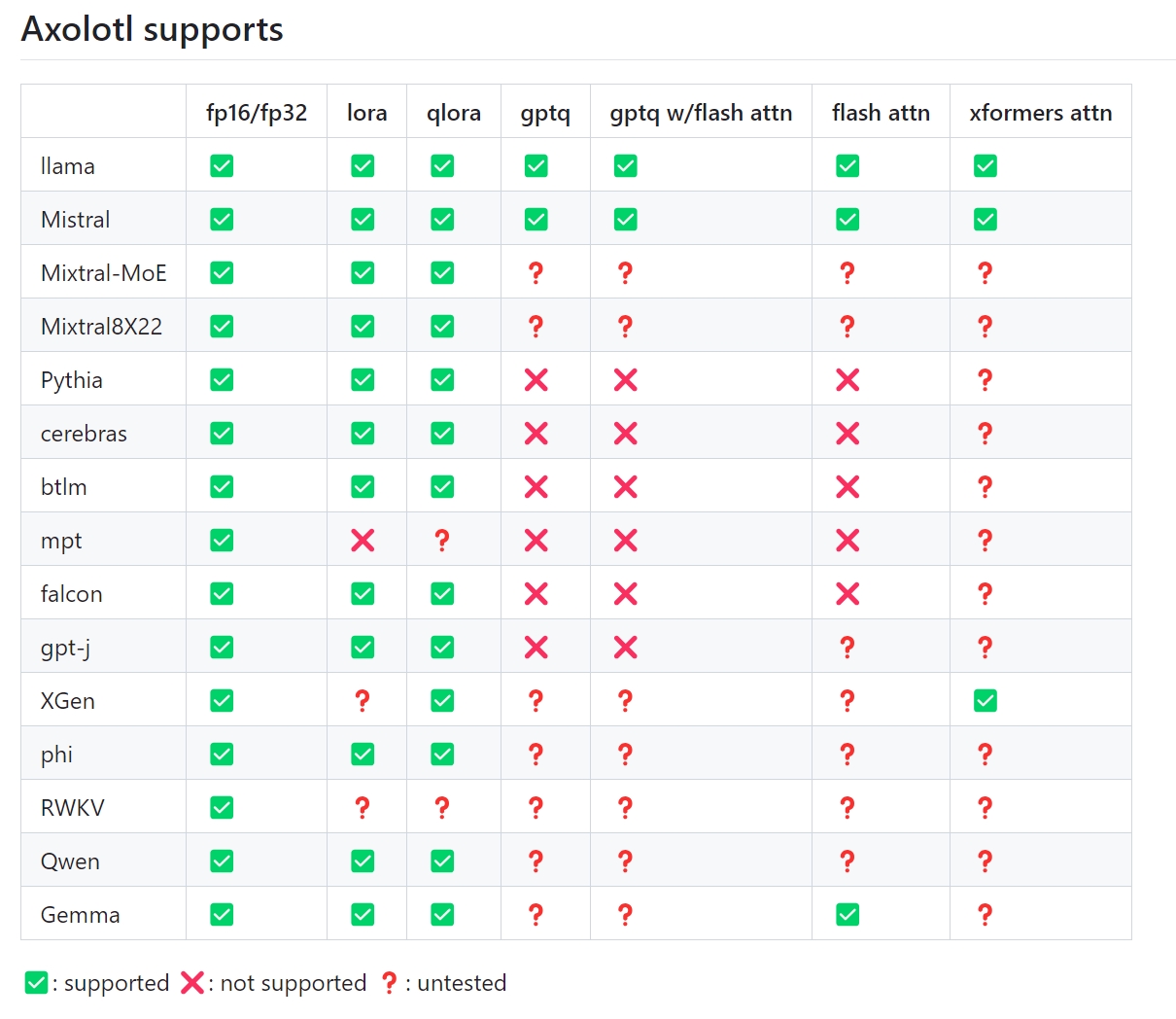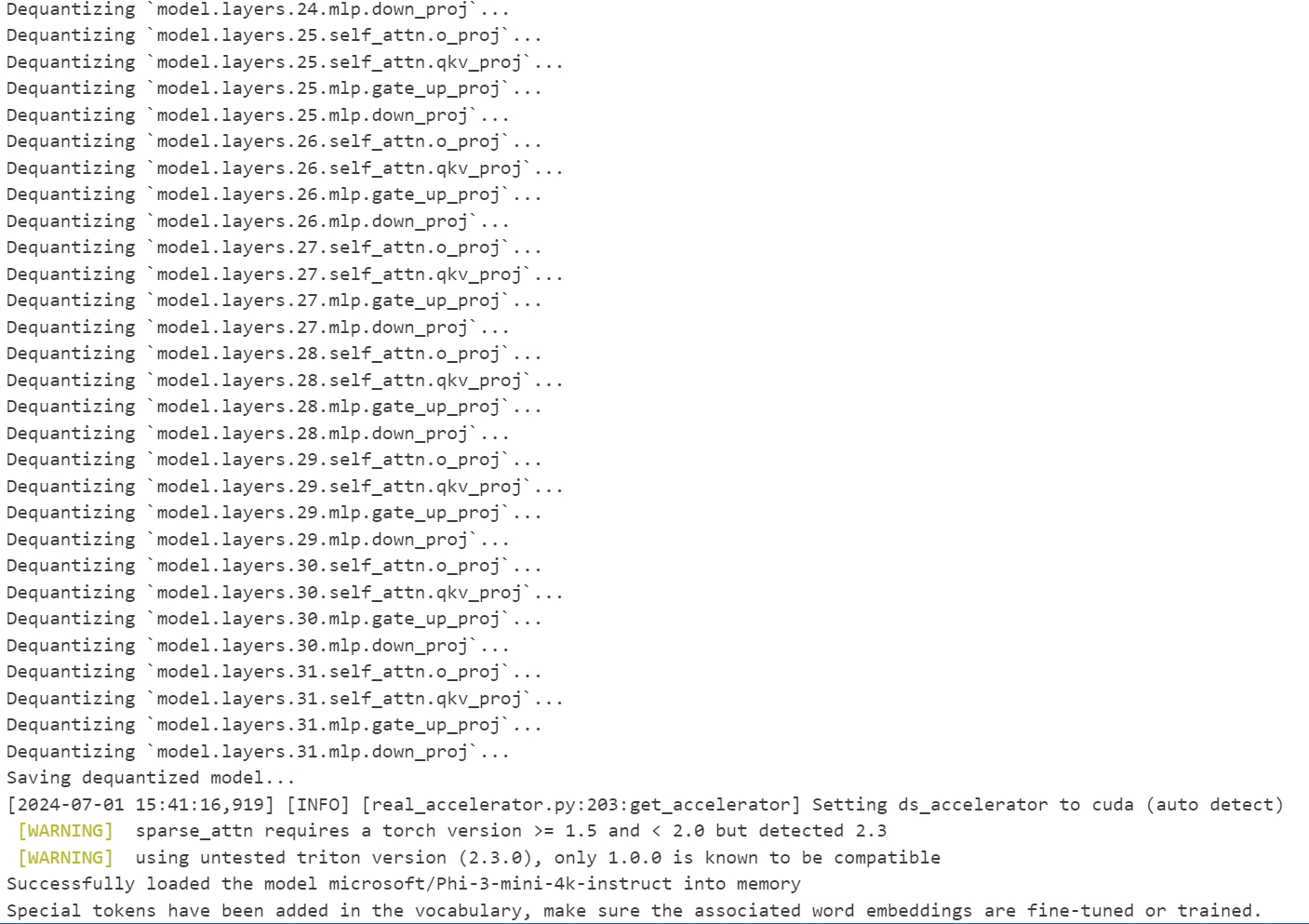Notice:
- After FT Axolotl fine tuning, suggest inference with vLLM
- Pay attention to version compatibility of Linux kernel, CUDA, torch, deepspeed(if you use).
Axolotl is a tool designed to streamline the fine-tuning of various AI models, offering support for multiple configurations and architectures. You should install Axolotl and related library according to the following link:
https://github.com/OpenAccess-AI-Collective/axolotl
Features:
- Train various Huggingface models such as llama, pythia, falcon, mpt
- Supports fullfinetune, lora, qlora, relora, and gptq
- Customize configurations using a simple yaml file or CLI overwrite
- Load different dataset formats, use custom formats, or bring your own tokenized datasets
- Integrated with xformer, flash attention, rope scaling, and multipacking
- Works with single GPU or multiple GPUs via FSDP or Deepspeed
- Easily run with Docker locally or on the cloud
- Log results and optionally checkpoints to wandb or mlflow
- Step 1: Use Axolotl to call DeepSpeed for QLoRA quantization (bnb) on phi-3-mini-4k, generating the quantized weight files.
- Step 2: Dequantize the parameters and weights generated in the first step, and merge them with the original phi-3-mini-4k to create a complete model.
Then do 4 tests:
- Merge adapter and original model together, then do inference with FP/BF16 on vLLM.
- Merge adapter and original model together, then do inference with FP/BF16 on HF transformer.
- Based on merged model #1, use bnb to quantization and inference on HF transformer.
- Use bnb to dynamically load the phi-3 base model, load the post-FT checkpoints as adapter, and then use the INFERENCE on HF transformer.
Notice:
- Flash atten2 is enable in 4 scenarios.
- Inference parameters are same in 4 scenarios.
Description: Merge adapter and original model together, then do inference with FP/BF16 on vLLM.
Inference Results:
Generation time: 11.48 seconds Tokens per second: 219.90 Prompt: 'Who is the current president of United States?' Generated text: Detailed and accurate response about Joe Biden being the current president.
Analysis: Model merging: Adapter and original model merged. Inference framework: vLLM. Precision: FP/BF16. Performance: Short generation time, high tokens per second, fast inference speed. Output quality: Generated text is detailed and accurate.
Merge adapter and original model together, then do inference with FP/BF16 on HF transformer.
Generation time: 45.78 seconds Tokens per second: 43.47 Prompt: 'Who is the current president of United States?' Generated text: Accurate response about Joe Biden being the current president, but with additional context and examples.
Model merging: Adapter and original model merged. Inference framework: HF transformer. Precision: FP/BF16. Performance: Longer generation time, lower tokens per second, slower inference speed. Output quality: Generated text is accurate but includes more context and examples, which may be more suitable for scenarios requiring detailed explanations.
Based on merged model #1, use bnb to quantize and infer on HF transformer.
Generation time: 21.50 seconds Tokens per second: 24.93 Prompt: 'Who is the current president of United States?' Generated text: Accurate response about Joe Biden being the current president, with brief context.
Model merging: Based on merged model #1. Inference framework: HF transformer. Quantization method: bnb quantization. Performance: Moderate generation time, lower tokens per second, moderate inference speed. Output quality: Generated text is accurate with brief context, suitable for scenarios requiring concise answers.
Description: Use bnb to dynamically load the phi-3 base model, load the post-FT checkpoints as adapter, and then use the INFERENCE on HF transformer.
Model loading time: 1.92 seconds Generation time: 95.35 seconds Tokens per second: 20.87 Prompt: 'Who is the current president of United States?' Generated text: Accurate response about Joe Biden being the current president, with repetitive context.
Model loading: Dynamically load phi-3 base model, load post-FT checkpoints as adapter. Inference framework: HF transformer. Quantization method: bnb quantization. Performance: Short model loading time, but longest generation time, lowest tokens per second, slowest inference speed. Output quality: Generated text is accurate but contains repetitive context, which may need further optimization to reduce redundancy.
- Performance: Scenario 1 has the fastest inference speed, while Scenario 4 has the slowest.
- Output Quality: Scenarios 1 and 2 have higher output quality, Scenario 3 provides concise output, and Scenario 4 has repetitive content.
- Applicable Scenarios: Scenario 1 is suitable for applications requiring quick responses Scenario 2 is suitable for applications requiring detailed explanations Scenario 3 is suitable for applications requiring concise answers Scenario 4 may need further optimization to reduce redundancy.
Before to use axolotl run fine tuning, we need set accelerate.
(axolotl) root@h100vm:~/axolotl-test# accelerate config
In which compute environment are you running?
This machine
Which type of machine are you using?
No distributed training
Do you want to run your training on CPU only (even if a GPU / Apple Silicon / Ascend NPU device is available)? [yes/NO]:
Do you wish to optimize your script with torch dynamo?[yes/NO]:yes
Which dynamo backend would you like to use?
cudagraphs
Do you want to customize the defaults sent to torch.compile? [yes/NO]:
Do you want to use DeepSpeed? [yes/NO]: yes
Do you want to specify a json file to a DeepSpeed config? [yes/NO]: no
What should be your DeepSpeed's ZeRO optimization stage?
false
Where to offload optimizer states?
none
Where to offload parameters?
none
How many gradient accumulation steps you're passing in your script? [1]: 0
Do you want to use gradient clipping? [yes/NO]: no
Do you want to enable `deepspeed.zero.Init` when using ZeRO Stage-3 for constructing massive models? [yes/NO]: yes
Do you want to enable Mixture-of-Experts training (MoE)? [yes/NO]: no
How many GPU(s) should be used for distributed training? [1]:1
Do you wish to use FP16 or BF16 (mixed precision)?
fp16
accelerate configuration saved at /root/.cache/huggingface/accelerate/default_config.yaml
All setting is saved in /root/.cache/huggingface/accelerate/default_config.yaml, we could change it as need: /root/.cache/huggingface/accelerate/default_config.yaml
Create yaml file on Azure GPU VM:
(axolotl-test) root@h100vm:~/axolotl-test# cat 1.yaml
base_model: microsoft/Phi-3-mini-4k-instruct
trust_remote_code: true
lora_modules_to_save:
- embed_tokens
- lm_head
deepspeed_config:
zero_optimization:
stage: 2 # Set the appropriate stage (1, 2, or 3)
offload_optimizer: true
offload_param: true
zero3_init_flag: false
gradient_accumulation_steps: auto
bnb_config_kwargs:
llm_int8_has_fp16_weight: false
bnb_4bit_quant_type: nf4
bnb_4bit_use_double_quant: true
load_in_4bit: true
strict: false
datasets:
- path: PhilipMay/UltraChat-200k-ShareGPT-clean
split: train
type: sharegpt
conversation: chatml
#For the chat template, I use chatml.
chat_template: chatml
output_dir: ./ultrachat-200k-sharegpt1
#We must set that we are fine-tuning a QLoRA adapter with this line
adapter: qlora
sequence_len: 4096
sample_packing: false
eval_sample_packing: false
pad_to_sequence_len: true
lora_r: 16
lora_alpha: 16
lora_dropout: 0.05
lora_target_modules:
- q_proj
- v_proj
- k_proj
- o_proj
- gate_proj
- down_proj
- up_proj
gradient_accumulation_steps: 1
micro_batch_size: 32
optimizer: paged_adamw_8bit
lr_scheduler: linear
learning_rate: 0.0001
test_datasets:
- path: PhilipMay/UltraChat-200k-ShareGPT-clean
split: test
type: sharegpt
conversation: chatml
bf16: auto
gradient_checkpointing: true
gradient_checkpointing_kwargs:
use_reentrant: true
flash_attention: true
warmup_ratio: 0.1
num_epochs: 1
logging_steps: 10
eval_steps: 100
saves_per_epoch: 1
weight_decay: 0.0
#The special token used for padding Llama 3
special_tokens:
pad_token: <|eot_id|>
Lanuch training:
(axolotl-test2) root@h100vm:~/axolotl-test# accelerate launch -m axolotl.cli.train 1.yaml
[2024-06-30 08:58:01,632] [INFO] [comm.py:668:init_distributed] Initializing TorchBackend in DeepSpeed with backend nccl
dP dP dP
88 88 88
.d8888b. dP. .dP .d8888b. 88 .d8888b. d8888P 88
88' `88 `8bd8' 88' `88 88 88' `88 88 88
88. .88 .d88b. 88. .88 88 88. .88 88 88
`88888P8 dP' `dP `88888P' dP `88888P' dP dP
GPU cumsuption during training:

Check the trained models:
root@h100vm:~/axolotl-test/ultrachat-200k-sharegpt1# ls
adapter_config.json added_tokens.json checkpoint-63 config.json special_tokens_map.json tokenizer.json tokenizer.model tokenizer_config.json
# Base model and adapter paths
model_name = "microsoft/Phi-3-mini-4k-instruct"
adapter_path = "/root/axolotl-test/ultrachat-200k-sharegpt1/checkpoint-63"
compute_dtype = torch.bfloat16
save_dir = os.path.abspath("./dqz_merge1")
def dequantize_model(model, to='./dequantized_model', dtype=torch.float16, device="cuda"):
os.makedirs(to, exist_ok=True)
cls = bnb.nn.Linear4bit
with torch.no_grad():
for name, module in model.named_modules():
if isinstance(module, cls):
print(f"Dequantizing `{name}`...")
quant_state = copy.deepcopy(module.weight.quant_state)
quant_state.dtype = dtype
weights = dequantize_4bit(module.weight.data, quant_state=quant_state, quant_type="nf4").to(dtype)
new_module = torch.nn.Linear(module.in_features, module.out_features, bias=None, dtype=dtype)
new_module.weight = torch.nn.Parameter(weights)
new_module.to(device=device, dtype=dtype)
parent, target, target_name = _get_submodules(model, name)
setattr(parent, target_name, new_module)
model.is_loaded_in_4bit = False
print("Saving dequantized model...")
model.save_pretrained(to)
config_data = json.loads(open(os.path.join(to, 'config.json'), 'r').read())
config_data.pop("quantization_config", None)
config_data.pop("pretraining_tp", None)
with open(os.path.join(to, 'config.json'), 'w') as config:
config.write(json.dumps(config_data, indent=2))
return model
quantization_config = BitsAndBytesConfig(
load_in_4bit=True,
bnb_4bit_compute_dtype=compute_dtype,
bnb_4bit_use_double_quant=True,
bnb_4bit_quant_type="nf4",
)
try:
print(f"Starting to load the model {model_name} into memory")
model = AutoModelForCausalLM.from_pretrained(
model_name,
quantization_config=quantization_config,
torch_dtype=compute_dtype,
device_map={"": 0}
)
model = dequantize_model(model, to='./dqz_model1/', dtype=compute_dtype)
model = PeftModel.from_pretrained(model, adapter_path)
model = model.merge_and_unload()
print(f"Successfully loaded the model {model_name} into memory")
model.save_pretrained(save_dir, safe_serialization=True)
# Save the tokenizer as well
tokenizer = AutoTokenizer.from_pretrained(model_name)
tokenizer.save_pretrained(save_dir)
config_data = json.loads(open(os.path.join(save_dir, 'config.json'), 'r').read())
config_data.pop("quantization_config", None)
config_data.pop("pretraining_tp", None)
with open(os.path.join(save_dir, 'config.json'), 'w') as config:
config.write(json.dumps(config_data, indent=2))
Merge Result:
def load_llm_model(save_dir, gpu_memory_utilization=0.6, disable_sliding_window=True):
# Load the fine-tuned model with vllm
print(f"Loading LLM model from directory: {save_dir}")
llm = LLM(
model=save_dir,
trust_remote_code=True,
gpu_memory_utilization=gpu_memory_utilization,
disable_sliding_window=disable_sliding_window
)
return llm
# Define prompts
prompts = [
"Who is the current president of United States?",
"Hello, my name is",
"The capital of France is",
"The future of AI is",
]
# Define sampling parameters
sampling_params = SamplingParams(
temperature=1,
top_p=0.95,
max_tokens=2000,
)
if __name__ == "__main__":
try:
save_dir = os.path.abspath("/root/axolotl-test/ultrachat-200k-sharegpt/dqz_merge1") # 使用绝对路径
print(f"Loading model from {save_dir}")
start_time = time.time()
llm = load_llm_model(save_dir)
load_time = time.time()
print("Model loaded successfully")
print(f"Model loading time: {load_time - start_time:.2f} seconds")
# Generate outputs
gen_start_time = time.time()
outputs = llm.generate(prompts, sampling_params)
gen_end_time = time.time()
print("Generation completed")
print(f"Generation time: {gen_end_time - gen_start_time:.2f} seconds")
# Calculate tokens per second
total_generated_tokens = sum(len(output.outputs[0].text.split()) for output in outputs)
gen_time = gen_end_time - gen_start_time
tokens_per_second = total_generated_tokens / gen_time if gen_time > 0 else float('inf')
print(f"Tokens per second: {tokens_per_second:.2f}")
# Print the outputs
for output in outputs:
prompt = output.prompt
generated_text = output.outputs[0].text
print(f"Prompt: {prompt!r}, Generated text: {generated_text!r}")
total_time = time.time()
print(f"Total execution time: {total_time - start_time:.2f} seconds")
except Exception as e:
print(f"An error occurred: {e}")
traceback.print_exc()
def load_llm_model(save_dir, gpu_memory_utilization=0.9):
# Load the fine-tuned model with transformers
print(f"Loading LLM model from directory: {save_dir}")
# Load tokenizer
tokenizer = AutoTokenizer.from_pretrained(save_dir, trust_remote_code=True)
# Load model
model = AutoModelForCausalLM.from_pretrained(
save_dir,
device_map="auto",
trust_remote_code=True,
attn_implementation="flash_attention_2",
max_memory={0: f'{int(gpu_memory_utilization * 100)}GB'},
torch_dtype=compute_dtype # Ensure the model uses bf16
)
return model, tokenizer
# Define prompts
prompts = [
"Who is the current president of United States?",
"Hello, my name is",
"The capital of France is",
"The future of AI is",
]
def generate(model, tokenizer, prompts, max_tokens=2000, temperature=1.0, top_p=0.95):
inputs = tokenizer(prompts, return_tensors="pt", padding=True)
input_ids = inputs.input_ids.to(model.device) # Keep input_ids as Long type
start_gen_time = time.time()
with torch.no_grad():
outputs = model.generate(
input_ids=input_ids,
max_length=max_tokens,
temperature=temperature,
top_p=top_p,
do_sample=True
)
end_gen_time = time.time()
gen_time = end_gen_time - start_gen_time
generated_tokens = outputs.size(1) - input_ids.size(1) # Subtract input length to get the number of generated tokens
tokens_per_second = generated_tokens / gen_time if gen_time > 0 else float('inf')
return outputs, tokens_per_second
if __name__ == "__main__":
try:
save_dir = os.path.abspath("/root/axolotl-test/ultrachat-200k-sharegpt/dqz_merge1")
print(f"Loading model from {save_dir}")
start_time = time.time()
model, tokenizer = load_llm_model(save_dir)
load_time = time.time()
print("Model loaded successfully")
print(f"Model loading time: {load_time - start_time:.2f} seconds")
# Generate outputs
gen_start_time = time.time()
outputs, tokens_per_second = generate(model, tokenizer, prompts)
gen_end_time = time.time()
print("Generation completed")
print(f"Generation time: {gen_end_time - gen_start_time:.2f} seconds")
print(f"Tokens per second: {tokens_per_second:.2f}")
# Print the outputs
for i, output in enumerate(outputs):
prompt = prompts[i]
generated_text = tokenizer.decode(output, skip_special_tokens=True)
print(f"Prompt: {prompt!r}, Generated text: {generated_text!r}")
total_time = time.time()
print(f"Total execution time: {total_time - start_time:.2f} seconds")
except Exception as e:
print(f"An error occurred: {e}")
traceback.print_exc()
def load_llm_model(save_dir):
# Load the fine-tuned model with transformers
print(f"Loading LLM model from directory: {save_dir}")
# Load tokenizer
tokenizer = AutoTokenizer.from_pretrained(save_dir, trust_remote_code=True)
quantization_config = BitsAndBytesConfig(
load_in_4bit=True,
bnb_4bit_compute_dtype=compute_dtype, # Ensure the model uses bf16
bnb_4bit_use_double_quant=True,
bnb_4bit_quant_type="nf4",
)
# Load model with quantization
model = AutoModelForCausalLM.from_pretrained(
save_dir,
device_map="auto",
trust_remote_code=True,
attn_implementation="flash_attention_2",
max_memory={0: f'{int(gpu_memory_utilization * 100)}GB'},
torch_dtype=compute_dtype,
quantization_config=quantization_config # Add quantization config
)
return model, tokenizer
# Define prompts
prompts = [
"Who is the current president of United States?",
"Hello, my name is",
"The capital of France is",
"The future of AI is",
]
def generate(model, tokenizer, prompts, max_tokens=2000, temperature=1.0, top_p=0.95):
inputs = tokenizer(prompts, return_tensors="pt", padding=True)
input_ids = inputs.input_ids.to(model.device) # Keep input_ids as Long type
start_gen_time = time.time()
with torch.no_grad():
outputs = model.generate(
input_ids=input_ids,
max_length=max_tokens,
temperature=temperature,
top_p=top_p,
do_sample=True
)
end_gen_time = time.time()
gen_time = end_gen_time - start_gen_time
generated_tokens = outputs.size(1) - input_ids.size(1) # Subtract input length to get the number of generated tokens
tokens_per_second = generated_tokens / gen_time if gen_time > 0 else float('inf')
return outputs, tokens_per_second
if __name__ == "__main__":
try:
save_dir = os.path.abspath("/root/axolotl-test/ultrachat-200k-sharegpt/dqz_merge1")
print(f"Loading model from {save_dir}")
start_time = time.time()
model, tokenizer = load_llm_model(save_dir)
load_time = time.time()
print("Model loaded successfully")
print(f"Model loading time: {load_time - start_time:.2f} seconds")
# Generate outputs
gen_start_time = time.time()
outputs, tokens_per_second = generate(model, tokenizer, prompts)
gen_end_time = time.time()
print("Generation completed")
print(f"Generation time: {gen_end_time - gen_start_time:.2f} seconds")
print(f"Tokens per second: {tokens_per_second:.2f}")
# Print the outputs
for i, output in enumerate(outputs):
prompt = prompts[i]
generated_text = tokenizer.decode(output, skip_special_tokens=True)
print(f"Prompt: {prompt!r}, Generated text: {generated_text!r}")
total_time = time.time()
print(f"Total execution time: {total_time - start_time:.2f} seconds")
except Exception as e:
print(f"An error occurred: {e}")
traceback.print_exc()
model_name = "microsoft/Phi-3-mini-4k-instruct"
adapter_path = "/root/axolotl-test/ultrachat-200k-sharegpt1/checkpoint-63"
quantization_config = BitsAndBytesConfig(
load_in_4bit=True,
bnb_4bit_compute_dtype=torch.bfloat16,
bnb_4bit_use_double_quant=True,
bnb_4bit_quant_type="nf4",
)
model = AutoModelForCausalLM.from_pretrained(
model_name,
quantization_config=quantization_config,
attn_implementation="flash_attention_2",
torch_dtype=torch.bfloat16,
device_map={"": 0}
)
model = PeftModel.from_pretrained(model, adapter_path)
tokenizer = AutoTokenizer.from_pretrained(model_name)
device = torch.device("cuda" if torch.cuda.is_available() else "cpu")
model.to(device)
prompts = [
"Who is the current president of United States?",
"Hello, my name is",
"The capital of France is",
"The future of AI is",
]
def generate(model, tokenizer, prompts, max_tokens=2000, temperature=1.0, top_p=0.95):
inputs = tokenizer(prompts, return_tensors="pt", padding=True)
input_ids = inputs.input_ids.to(model.device) # Keep input_ids as Long type
start_gen_time = time.time()
with torch.no_grad():
outputs = model.generate(
input_ids=input_ids,
max_length=max_tokens,
temperature=temperature,
top_p=top_p,
do_sample=True
)
end_gen_time = time.time()
gen_time = end_gen_time - start_gen_time
generated_tokens = outputs.size(1) - input_ids.size(1) # Subtract input length to get the number of generated tokens
tokens_per_second = generated_tokens / gen_time if gen_time > 0 else float('inf')
return outputs, tokens_per_second
if __name__ == "__main__":
try:
save_dir = os.path.abspath("/root/axolotl-test/ultrachat-200k-sharegpt/dqz_merge1") # 使
print(f"Loading model from {save_dir}")
start_time = time.time()
def load_llm_model(save_dir):
model = AutoModelForCausalLM.from_pretrained(
model_name,
quantization_config=quantization_config,
attn_implementation="flash_attention_2",
torch_dtype=torch.bfloat16,
device_map={"": 0}
)
model = PeftModel.from_pretrained(model, adapter_path)
tokenizer = AutoTokenizer.from_pretrained(model_name)
return model, tokenizer
model, tokenizer = load_llm_model(save_dir)
load_time = time.time()
print("Model loaded successfully")
print(f"Model loading time: {load_time - start_time:.2f} seconds")
# Generate outputs
gen_start_time = time.time()
outputs, tokens_per_second = generate(model, tokenizer, prompts)
gen_end_time = time.time()
print("Generation completed")
print(f"Generation time: {gen_end_time - gen_start_time:.2f} seconds")
print(f"Tokens per second: {tokens_per_second:.2f}")
# Print the outputs
for i, output in enumerate(outputs):
prompt = prompts[i]
generated_text = tokenizer.decode(output, skip_special_tokens=True)
print(f"Prompt: {prompt!r}, Generated text: {generated_text!r}")
total_time = time.time()
print(f"Total execution time: {total_time - start_time:.2f} seconds")
except Exception as e:
print(f"An error occurred: {e}")
import traceback
traceback.print_exc()


